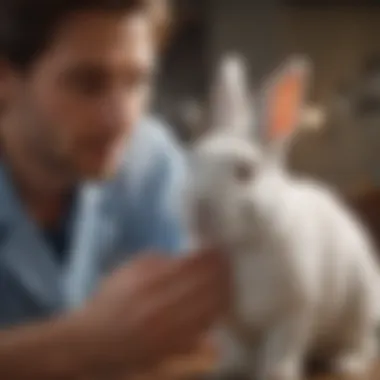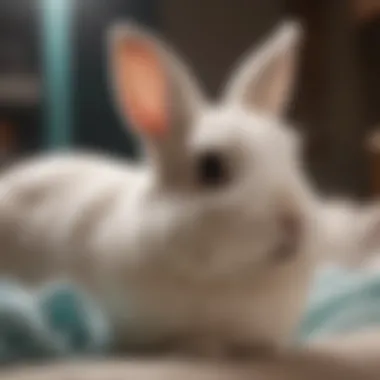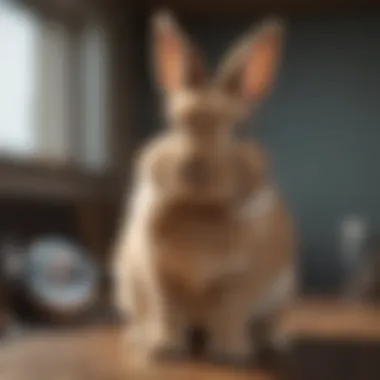Where to Neuter Your Bunny: A Comprehensive Guide


Intro
Neutering your bunny is a significant decision with long-term implications for their health and behavior. Understanding where to seek neutering services is crucial for pet owners. This article will explore the various options available for neutering bunnies, the questions to ask veterinary professionals, and the importance of proper post-operative care. By gaining insights into these areas, you will be better equipped to ensure a safe and healthy process for your pet.
Understanding Your Pet
Neutering has various benefits including behavioral improvements and health management. To make an informed choice, it's essential to understand your bunny's unique needs and characteristics.
Pet Behavior Basics
Bunnies are social animals. Their behavior can change significantly based on their living conditions and health status. Neutering can help reduce aggressive tendencies and territorial behaviors. By knowing how your pet behaves, you can respond aptly to their needs.
Common Breed Characteristics
Certain breeds exhibit distinct traits. For example, Holland Lops tend to be more docile, while Netherland Dwarfs may exhibit lively and playful behaviors. Understanding these characteristics can inform your decision on when and how to neuter your specific breed, leading to improved outcomes.
Species-Specific Needs
Every species requires different considerations when it comes to care. Rabbits, unlike dogs or cats, have unique anatomical and physiological features that affect their neutering process. A conversation with a rabbit-savvy veterinarian will reveal their specific needs, ensuring a safe procedure.
Pet Care and Maintenance
Proper maintenance is vital for any pet's well-being, especially during the pre-and post-neutering phases.
Feeding Guidelines
Keep your bunny's diet balanced before and after the surgery. A diet rich in hay, fresh vegetables, and limited pellets will help maintain their health and assist in recovery. Always consult with your vet for specific recommendations tailored to your pet.
Grooming Essentials
Regular grooming can help prevent matting and promote skin health. Brushing helps keep your bunny clean, especially during shedding seasons. This can be a good bonding time before the surgery.
Hygiene Practices
Maintaining a clean living environment is essential. Regularly clean their habitat to reduce stress and promote healing. Good hygiene supports their overall health and can help prevent post-operative infections.
Training and Development
A well-trained bunny is often happier and better socialized. Here are some strategies to enhance their behavior.
Basic Commands and Skills
Teaching your bunny simple commands can improve communication between you and your pet. Start with basic commands like
Understanding Bunny Neutering
Neutering is a significant decision for pet owners considering the well-being and behavior of their bunnies. Understanding this procedure is crucial in ensuring a healthy and balanced relationship with your pet. Neutering can serve multiple purposes, such as promoting health, resolving behavioral issues, and assisting in population control.
Definition and Purpose
Neutering refers to the surgical removal of the reproductive organs of bunnies. For males, this is known as castration, whereas for females, it is termed spaying. The primary purpose of neutering is to prevent unwanted breeding, but it also has profound effects on the pet's health and behavior.
Benefits of Neutering
Health Benefits
Neutering can significantly contribute to the overall health of your bunny. One of the major health benefits is a reduced risk of reproductive cancers. Female bunnies, when spayed before their first heat cycle, have a lower chance of developing mammary tumors. Male bunnies also benefit, as neutering can help prevent testicular cancer.
Behavioral Improvements
Many bunnies exhibit behavioral concerns that can be alleviated through neutering. Unneutered male rabbits may show aggression, territorial marking, and mounting behaviors. After neutering, many owners notice a calmer and more sociable temperament in their pets. Behavioral improvements can lead to a better quality of life for both the bunny and its owner, fostering a more harmonious home environment.
Population Control


Another crucial aspect of neutering is its role in population control. Bunnies breed at a rapid rate, and unplanned litters can contribute to overpopulation. By having your bunny neutered, you are not only taking responsibility for your pet but also helping to mitigate the burden on animal shelters and rescues.
Risks and Considerations
Surgical Risks
As with any surgical procedure, there are inherent risks involved with neutering. Complications may arise, including infections, excessive bleeding, or adverse reactions to anesthesia. Choosing a qualified veterinarian who specializes in small animals can minimize these risks. Always express your concerns and ask about their experience with bunny surgeries.
Recovery Issues
Post-operative recovery can vary from one bunny to another. Some animals may experience discomfort, lethargy, or loss of appetite after the procedure. It is vital to monitor your bunny closely during recovery. Ensure that they have a quiet, comfortable space with minimal stress. If any concerning signs arise, contact your veterinarian immediately.
Neutering is an important aspect of responsible bunny ownership. Understanding the benefits and risks can help you make an informed decision.
Finding a Suitable Veterinarian
Finding a suitable veterinarian for your bunny is crucial in ensuring a successful neutering procedure. This process is not just a routine surgical procedure; it involves careful consideration of the expertise and environment in which your pet will be treated. The right veterinarian can make a significant difference in both the safety and comfort of your bunny before, during, and after the surgery.
Choosing a veterinarian that specializes in or has substantial experience with bunnies can lead to better health outcomes. Consequently, you will also likely experience less anxiety regarding the process. A qualified vet can provide tailored advice, support, and aftercare specific to rabbits, which is integral for a smooth recovery.
Types of Veterinarians
General Veterinarians
General veterinarians are often the first point of contact for bunny owners. They provide a wide range of services and may also offer neutering. One key characteristic of general veterinarians is their accessibility. They are commonly found in various locations and typically have flexible hours, making it convenient for pet owners.
The benefit of choosing a general veterinarian includes a comprehensive understanding of various pet health issues, though their experience with bunnies specifically may vary. You may find that many general veterinarians can perform the surgery competently but may not be as experienced with post-operative care specific to rabbits.
Exotic Animal Specialists
Exotic animal specialists are veterinarians who specifically focus on non-traditional pets, including bunnies. Their key characteristic is in-depth knowledge of exotic pet care, which includes understanding their unique physiological and behavioral needs. This focus can be especially beneficial when it comes to neutering.
A unique advantage of opting for an exotic animal specialist is their extensive experience with rabbit behavior and health. They not only perform neutering but also offer nuanced insights into the recovery process. While their services may sometimes come at a premium, the specific expertise can be invaluable for your pet's wellbeing.
Assessing Veterinary Clinics
Facility Standards
Assessing facility standards is essential when searching for the right veterinary clinic. High-quality facilities demonstrate their commitment to pet safety and care. Indicators of a well-maintained clinic include cleanliness, modern equipment, and appropriate safety protocols.
One important aspect of facility standards is the availability of recovery areas that prioritize comfort. A clinic with good standards often has designated spaces for post-operative recovery, reducing stress and ensuring a more favorable healing environment.
Staff Qualifications
Staff qualifications play a vital role in veterinary care. A knowledgeable staff can greatly enhance the overall experience, both for the pet and the owner. When staff members have specialized training in exotic animals, you can expect better communication and more informed care.
Specialized training often comes from years of education and hands-on experience with various animal species. This expertise can ensure that staff effectively handle medical and behavioral issues specific to bunnies. Moreover, well-qualified staff can provide clearer instructions about pre-and post-surgical care, which is crucial for a smooth recovery.
Reviews and Recommendations
Online Reviews
Online reviews serve as a modern referral system for pet owners. They provide insights based on real experiences from other bunny owners. By browsing reviews, you can gauge the reputations of specific veterinarians and clinics in your area.
One significant characteristic of online reviews is their availability. Many pet owners openly share their experiences, which can guide you towards making an informed choice. These reviews often highlight specific areas of concern or praise, helping you evaluate whether a clinic meets your needs.
Personal Recommendations
Personal recommendations can be invaluable. Talking to fellow bunny owners can provide a depth of understanding that online reviews might not offer. A recommendation from someone who has gone through the process can be enlightening.
The key aspect of personal recommendations is building trust. Knowing someone who has had positive experiences can foster confidence in your choice. Be open to asking questions and gathering as much information as possible to make the best decision for your bunny.
Questions to Ask the Veterinarian


As a pet owner, ensuring the well-being of your bunny during the neutering process is crucial. It is not only about finding the right veterinarian but also about asking the right questions. This section will help you identify key inquiries to make, ensuring that you get the necessary information to make informed decisions regarding your bunny's health.
Experience with Bunny Neutering
When selecting a veterinarian, assessing their experience with bunny neutering is important. Not all veterinarians have equal exposure to this procedure. A vet who frequently performs neutering surgeries on rabbits better understands their unique anatomy and needs.
Inquire about the specific number of bunny neuters the veterinarian has conducted. This question sheds light on their practical skills and familiarity with the procedure. A vet with extensive experience may offer better outcomes and will likely handle any associated complications more effectively.
Additionally, consider asking if the clinic has previously treated any postoperative concerns or emergencies related to bunny neutering. This can provide insight into their capability in managing unexpected situations, thus enhancing your confidence in their skills.
Neutering Process Explained
Understanding the neutering process can significantly ease your anxiety as a pet owner. A vet should clearly outline the surgical procedure. This includes details such as anesthesia administration, the surgical method, and how the veterinarian plans to monitor your bunny throughout the process.
Ask about the specific steps involved from the moment your bunny arrives at the clinic until the surgery is complete. Knowing what to expect can lessen your concerns and can prepare you for potential postoperative care requirements. A vet who provides thorough explanations demonstrates a commitment to transparency, which is a good sign.
Post-Operative Care
Post-operative care is a vital aspect of the neutering process. Once the surgery is complete, there will be specific care protocols to follow to keep your bunny healthy and comfortable. Asking about this phase can help you understand your responsibility in your pet's recovery.
Pain Management
Pain management plays a significant role in post-operative care. It is crucial to ensure that your bunny is as comfortable as possible after the surgery. A veterinarian should discuss the pain management strategies they will employ. Typical methods include administering analgesics pre-and post-surgery.
Understanding the pain management options allows you to choose a method best suited for your bunny. Some vets may prefer whole-body anesthetics or localized anesthetic techniques. Each choice includes benefits and potential drawbacks. Always feel free to discuss these aspects with your vet to find the best solution for your pet.
Signs of Complications
Monitoring for signs of complications after neutering is essential for your bunny's recovery. Discuss with your veterinarian what specific signs you should be vigilant about. These may include excessive swelling, bleeding, or unusual behavior.
A veterinarian should provide clear guidelines on when to seek further assistance. Knowing the warning signs can help ensure that any problems are caught early. This proactive approach can greatly improve your bunny’s recovery experience. By keeping an open line of communication with your vet, you will also enhance the care provided for your bunny in this crucial period.
Preparing for the Neutering Appointment
Preparing for a bunny neutering appointment is a crucial phase that pet owners should not underestimate. The preparation process involves multiple aspects that ensure the health and safety of your pet during this important procedure. Having a clear understanding of what is necessary before the appointment helps to alleviate potential anxieties and facilitates a smoother experience for both the owner and the rabbit.
Health Check and Consultation
Before the actual neutering process, a health check is indispensable. This consultation helps the veterinarian assess the bunny's overall health and identify any underlying issues that could complicate the surgery. During the health check, the vet will perform a physical examination, covering aspects like weight, dental health, and signs of illness.
Pet owners should be prepared to discuss their bunny's medical history. This includes any past illnesses, medications, or behavioral issues that might be relevant. Effective communication with the veterinarian can help tailor the procedure to the specific needs of your rabbit. A thorough consultation creates a foundation of trust between you, your pet, and the veterinarian, ensuring everyone is on the same page.
Fasting Requirements
Fasting is another critical component in preparing for a neutering appointment. Generally, bunnies should not eat for a specified time before surgery. This recommendation stems from the need to minimize the risk of complications during anesthesia. The common practice is to withhold food for several hours prior. This can vary depending on the veterinarian’s specific protocols, so clarify this in advance to avoid any confusion.
While fasting, it’s vital to ensure that your rabbit has access to water. Dehydration can pose additional risks, so maintaining hydration during this period is essential. By understanding and adhering to fasting requirements, the pet owner can further enhance the safety of the operation.
Transportation Considerations
How you transport your bunny to the vet is also an aspect that should not be overlooked. A safe and comfortable carrier is essential. It will help reduce stress for the rabbit during transit. Ensure that the carrier is well-ventilated and not too large, as too much room can make your bunny feel insecure. Additionally, placing a soft towel or bedding inside will provide comfort during the ride.
Make sure to drive carefully to minimize bumps and jolts, as these can upset your pet in transit. One should also plan for potential delays. Arriving well in advance allows you to address any last-minute concerns with the veterinary staff or the veterinarian. By considering these transportation details, you contribute to a calm and well-organized neutering experience for your bunny.
Post-Neutering Care
Post-neutering care is a crucial aspect of ensuring your bunny recovers smoothly and without complications. After the procedure, your pet will need special attention and a safe environment to heal. This not only promotes faster recovery but also helps prevent potential stress or health issues.
Home Recovery Environment
Creating a comfortable home recovery environment for your bunny is essential. Set up a quiet space away from the noise of everyday life. This area should have soft bedding, such as towels or blankets, to provide warmth and comfort. Ensure that the space is secure, as a recovering bunny may be disoriented and could try to jump or escape.
It's important to keep their recovery area clean. Use only non-toxic cleaners to maintain hygiene without causing irritation to your bunny's sensitive skin. Avoid any items that could be chewed or swallowed, as post-operative bunnies can be curious.


Monitoring Health Post-Operation
Monitoring your bunny's health after neutering is vital. In the first few days, observe for any signs of distress such as excessive whining or inability to eat. Bunny’s behavior may change during recovery; they might be less active than usual. Pay attention to their appetite. If your bunny shows no interest in food for more than 24 hours, consult your veterinarian.
Watch for any signs of swelling or redness around the incision site. This could indicate infection. Other symptoms to note are lethargy, vomiting, or diarrhea. Keeping a post-surgery log of their behavior and recovery will be helpful during follow-up appointments.
Follow-Up Appointments
Scheduling follow-up appointments with your veterinarian is critical. These visits allow the vet to check the surgical site and ensure proper healing. Typically, the first follow-up happens about a week after the procedure. It’s an opportunity to address any concerns regarding your bunny’s recovery.
During these appointments, don’t hesitate to ask any questions. Inquire about the healing progress and whether specific care measures should be maintained. Keeping open communication with your veterinarian contributes to a smooth and healthy recovery for your bunny.
Post-neutering care is critical for your bunny’s health and well-being. Pay close attention to their needs and consult with a veterinarian if anything seems amiss.
Cost Considerations
Understanding the cost considerations when neutering your bunny is crucial. Neutering not only aids in managing rabbit populations but also promotes better health and behavior in your pet. However, the expenses involved can vary greatly. This section will further explore average costs, influences on pricing, and available financial assistance options.
Average Costs for Neutering
The average cost of neutering a rabbit can range widely. Pet owners should expect to pay between $150 and $300. This price includes the surgical procedure, anesthesia, and post-operative care. It is important to recognize that costs can fluctuate depending on several factors, such as location, the veterinarian's experience, and the overall health of the bunny. Investing in this procedure is essential, as it not only improves the quality of life for rabbits but also can reduce the likelihood of certain health issues.
Factors Influencing Costs
Geographical Location
The geographical location significantly impacts the overall cost of neutering. In urban areas, the pricing tends to be higher due to increased demand and operational expenses faced by veterinary clinics. Conversely, in rural regions, costs may be lower due to reduced overhead. Cities like New York or San Francisco often have higher prices compared to smaller towns. On the upside, urban areas usually offer more specialized services, which can be a benefit.
Facility Type
The facility type also plays a vital role in determining the cost of neutering. Veterinary hospitals often charge more due to their advanced medical equipment and highly trained staff. In contrast, community clinics or shelters may offer lower prices as they aim to promote affordable pet care. While budget-friendly options are appealing, ensure the facility maintains high standards of care. Remember, the goal is not just to save money but to ensure the health and safety of your bunny during and after the procedure.
Insurance and Payment Plans
Some pet owners may find it beneficial to explore insurance or payment plans available for veterinary services. Many insurance companies offer coverage plans that include neutering as part of their routine health services. When selecting an insurance plan, examine details such as monthly premiums, deductibles, and coverage limits.
Some veterinary clinics also provide payment plans. These plans allow you to manage costs better by spreading expenses over several months. Always ask your veterinarian about available options and ensure you understand the terms before committing.
Investing in neutering for your bunny is not just a financial decision; it's a matter of health and well-being.
In summary, evaluating cost considerations is critical for informed decision-making when it comes to neutering your bunny. Being aware of average costs, local pricing variations, and financial support tools can help you make the best choice for your pet's health.
Finding Financial Assistance
Financial constraints can be a significant barrier when pet owners consider neutering their bunnies. Understanding the options available for financial assistance is crucial. This section aims to inform readers on how to access resources that can help alleviate the costs involved in the procedure.
Financial assistance can not only make neutering affordable but also ensure that more bunnies receive the necessary health benefits from the procedure. By exploring local organizations and government programs, pet owners can find pathways to support, contributing to healthier pet populations and responsible ownership.
Local Animal Welfare Organizations
Animal welfare organizations play a vital role in supporting pet owners. Many of these groups offer a range of services, including financial assistance for veterinary care. They often run specific programs aimed at reducing the cost of spaying and neutering.
These organizations may work with local veterinarians to provide reduced-rate services or even grants for eligible pet owners. It is important to research which organizations operate in your area. Here are some actions you can take:
- Visit local shelters and rescue groups to inquire about any available programs.
- Check social media pages for announcements about low-cost neutering events.
- Contact organizations directly to ask about their financial assistance options.
Accessing help from local animal welfare organizations can optimize the health of your bunny while making it financially feasible for you.
Government Programs
Various government programs also assist with the costs of neutering. These initiatives often aim to promote responsible pet ownership, control stray animal populations, and improve public health.
In many regions, state or local governments provide subsidies for pet owners. Some communities organize voucher programs that allow pet owners to receive discounts at participating veterinary clinics.
To explore government programs, consider the following steps:
- Check local government websites: Many municipalities have dedicated animal control or welfare pages that outline available resources.
- Contact local governmental agencies: A call to your local animal services office can provide specific information on financial assistance programs available in your area.
- Look for statewide initiatives: Some states operate broad programs that benefit residents across various counties.
Financial assistance can be essential for ensuring your bunny receives the necessary care without undue financial burden. By utilizing the resources available from local organizations and government programs, pet owners can navigate the costs associated with neutering more effectively.







